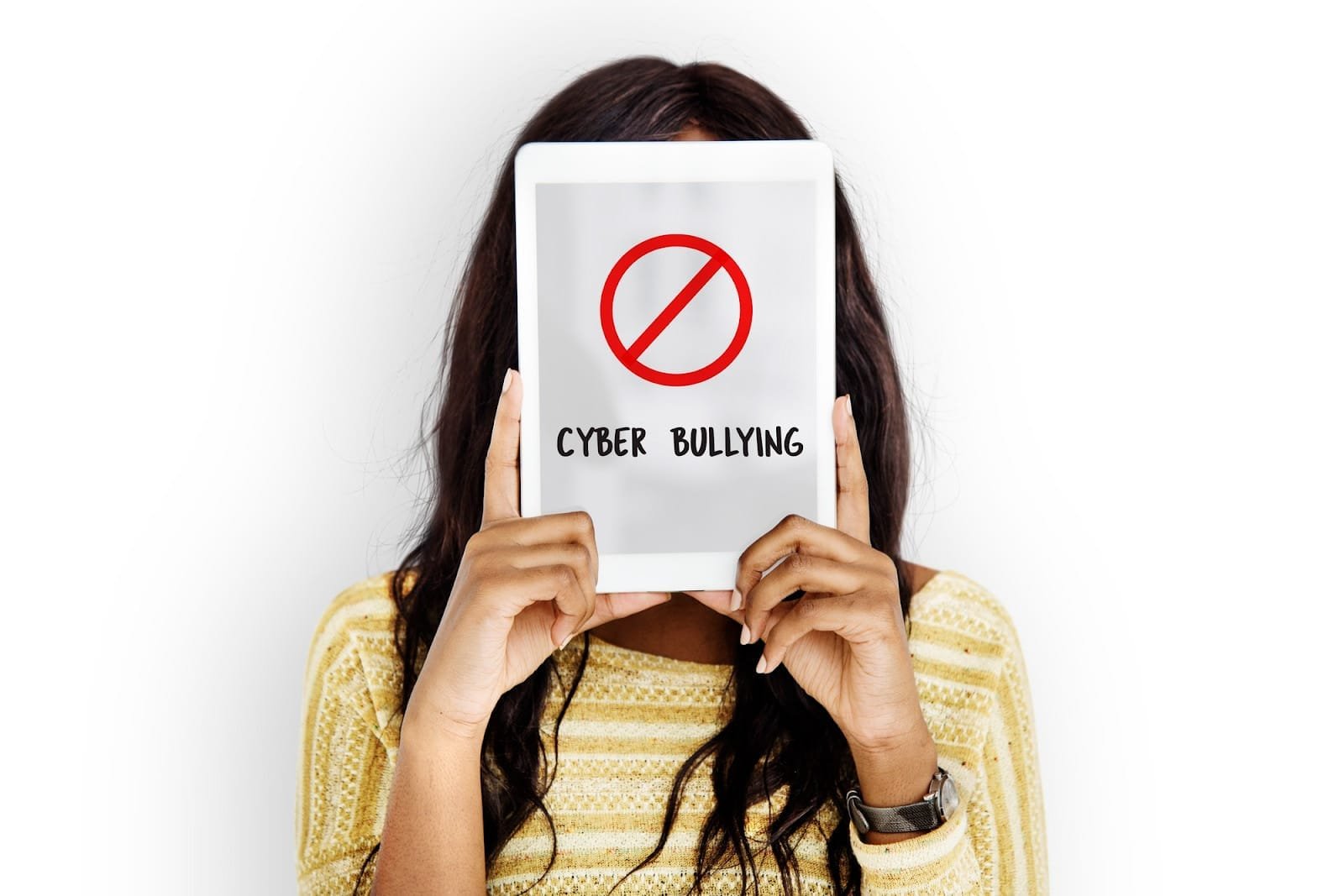
Harassment in Singapore is governed by the Protection from Harassment Act (POHA), which was set in force in 2014. It provides protection against multiple forms of harassment, both online and in real life. The act is regularly revised and expanded to cover new forms of harassment, such as doxing.
Harassment is a criminal offence under Singapore law and is punishable with a jail term, fine, or both. Different from assault, harassment generally refers to the non-physical forms of harm or intimidation.
What Is Harassment In Singapore?

Harassment in Singapore is defined by the POHA, which outlines a range of behaviours that are deemed unlawful.
These behaviours include threatening, abusive, or insulting words, actions, or communications aimed at causing harm. Harassment can occur when someone’s actions intentionally cause harassment, alarm or distress, or when such actions are likely to have that effect.
Under the harassment law in Singapore, it is not necessary for the perpetrator to physically harm the victim. Harassment covers verbal abuse, online harassment, and even non-verbal gestures that provoke emotional or psychological harm. Some examples include:
- A co-worker makes graphic and insulting sexual comments within earshot of others with the intent to cause you discomfort or distress.
- A classmate posts a false statement on social media that threatens you, and other classmates view the post, causing you anxiety and alarm.
In some cases, such a person may argue that their conduct was reasonable, but the Court’s decision will depend on the context and intention behind the behaviour. The POHA also prohibits actions that are intended to provoke violence or make someone fear that violence will occur.
If the harassment escalates, victims have the right to seek legal recourse, including a disabling order or other remedies that aim to protect people from further harm. The Court may also impose an imprisonment term if deemed necessary.
What Constitutes Harassment In Singapore?

It’s important to note that both individuals and entities (such as companies or associations) can be found guilty of harassment. Sections 3-7 of the POHA define what counts as harassment under Singapore law, which includes:
#1. Intentionally Harassing, Alarming Or Causing Distress To Another Party
According to Ssection 3 of the POHA, a party who uses any form of threatening, abusive or insulting communication, words or behaviour against another party is guilty of harassment if their intention is to cause alarm or distress. This includes both online and offline behaviour.
For example, if X was fired from their job and writes and sends a threatening letter to their ex-manager Y, causing Y to feel alarmed and afraid, X is guilty of harassment under Ssection 3 of the POHA.
If found guilty of causing intentional harassment, alarm or distress, the party can be fined up to $5,000, imprisoned for up to 6 months, or both. For a repeat offender, these maximum penalties are doubled (up to $10,000 fine and 12 months’ imprisonment).
#2. Behaving In Ways That Are Likely To Cause Alarm Or Distress To Another Party, Even When There Is No Intention To Do So
It is possible for a party to be found guilty of harassment even if that was not their explicit intention. Section 4 of the POHA states that as long as the victim has been alarmed, distressed, or been subject to harassment because of another’s abusive or insulting words or behaviour, that party is guilty of harassment.
For example, X published a vulgar tirade ranting about their classmate Y on a well-known website that many of their peers had access to. One of those peers found the post, showed it to Y, and Y became distressed over it. In this case, X is guilty of harassment under Section 4 of the POHA.
To defend against this type of harassment claim, the accused must prove that:
- They had no reason to believe that their words, behaviour or communication would ever be heard, perceived or seen by the victim; or
- Their conduct was reasonable.
If found guilty of harassment under Section 4 of the POHA, the individual or entity is subject to a fine of up to $5,000, but no jail time. However, if the party is a repeat offender, the maximum penalties will be raised to $10,000 in fines, 6 months’ jail time, or both.
#3. Instilling Fear Through Provocation Of Violence

If a party behaves in a manner that causes others to believe that unlawful violence will be used against them, they are guilty of harassment under Section 5 of the POHA.
In addition to direct threats against a specific victim, undirected threats of violence (for example, shouting in public to no one in particular while threatening violence and causing alarm) are still considered acts of harassment.
The maximum penalties for instilling fear due to provocation of violence is a fine of up to $5,000, imprisonment of up to 12 months, or both. These are doubled for repeat offenders.
#4. Insulting Or Behaving In An Indecent, Abusive Or Threatening Manner Toward Public Officials Or Public Service Workers
This applies specifically to behaviours taken against public officials or public service workers. If a party uses any indecent, threatening, abusive or insulting words or actions against a public official or public service worker, thereby obstructing them from their duty, that party is guilty of harassment under Section 6 of the POHA.
For example, two men were charged with harassment in 2020 for their use of verbally abusive or insulting language against public officials (a police officer and a Singapore Food Agency officer) during the course of their work.
For harassment against public officials or public service workers, the maximum punishment is up to $5,000 in fines, imprisonment of up to 12 months, or both.
#5. Unlawful Stalking
As defined by Section 7 of the POHA, examples of unlawful stalking include:
- Following a victim or a person related to them
- Communication or attempting to communicate with the victim or related persons after repeated requests to stop
- Entering or loitering outside the victim’s home, workplace, or other frequented areas
- Giving or sending unwanted items to the victim or placing it where the victim will find it
- Keeping the victim or related persons under surveillance
If any of these actions cause distress or alarm to the victim, the party is guilty of harassment due to unlawful stalking. Perpetrators are subject to a fine of up to $5,000, imprisonment of up to 12 months, or both, with maximum penalties doubled for repeat offenders.
#6. Doxxing
Across Sections 3 and 4 of the POHA, it is mentioned that the publication of any identity-related information of the target person or relations of the target person is considered harassment. This is referred to as doxxing – where “internet vigilantes” publish personal information about someone in the hopes of shaming or distressing them – and was added to the POHA as of 1 January 2020.
This was in response to an increasing number of such harassments in recent years, most notably with the case of netizens naming and shaming a Go-Jek passenger after a recording of her went viral on social media.
For publication of personal information with the intention to harass (non-physical harm), the maximum penalties are a fine of up to $5,000, imprisonment of up to 6 months, or both.
But if the publication was done with the intention to cause or facilitate violence (physical harm), the maximum penalties are a fine of up to $5,000, imprisonment of up to 12 months, or both.
What Is Workplace Harassment?

Workplace harassment refers to any behaviour in the workplace that causes or is likely to cause harassment, alarm or distress to another employee or colleague.
It differs from general harassment because it occurs within a professional setting, which can make the situation more complex due to power dynamics and organisational structures.
Examples of workplace harassment include:
- Use of threatening, abusive, or insulting language or gestures that undermine or intimidate the target person.
- Sexual comments or advances that are unwanted and inappropriate in the workplace.
- Stalking or persistent harassment outside of working hours, which could involve physical or online stalking.
- Cyberbullying, where harassing content is shared through emails, social media, or other digital platforms.
Workplace harassment does affect individuals and can create a toxic environment that impacts overall productivity. Employers are responsible for ensuring a safe working environment under the harassment law in Singapore. Failing to address harassment could expose companies to legal action.
The Tripartite Advisory on Managing Workplace Harassment provides guidelines for employers to protect their staff, including training programmes, clear reporting structures, and swift action to address complaints.
Employers are advised to ensure that their workplace policies cover various forms of harassment, and that they work actively to prevent further harassment of vulnerable persons or anyone else within the organisation.
Help! What Can I Do If I’m Being Harassed?

If you’re experiencing harassment in Singapore, it’s essential to take immediate action. The Harassment Act in Singapore provides legal avenues to protect individuals from further harm. Here’s what you should do:
- Document the Harassment: Keep a detailed chronology of events, including dates, times, locations, and the identity of the perpetrator. Collate as much evidence as possible, such as messages, emails, or screenshots, but only if doing so does not put you at risk. This documentation will be invaluable if you decide to pursue legal action under the Protection from Harassment Act (POHA). It will also help the police conduct thorough investigations when you report the case.
- Report the Incident: Make a police report at the nearest police station as soon as possible. The police will use your evidence to assess the situation and begin an investigation. Harassment, including intentionally causing harassment, alarm, or distress, is taken seriously, and offenders may expect enhanced penalties under the Harassment Act.
- Seek Legal Advice: If you feel threatened or unsure about your next steps, consult a criminal lawyer in Singapore. A lawyer can help you obtain a Protection Order (PO) to stop the harasser from continuing their abusive actions. This order can require the harasser to cease contact, remove harmful publications, or issue a correction notice if they have made false statements.
- Protection Order vs Expedited Protection Orders (EPO): While a standard PO can take weeks to be processed, if you believe you are in immediate danger, you should apply for an Expedited Protection Order. The EPO provides urgent protection while you wait for the final Court hearing. It’s advisable to have legal guidance during this process, as obtaining the order can be complex, and you must provide sufficient evidence to persuade the harassment Court.
- Non-Publication Orders: If the harassment involves defamatory or false statements, you can apply for a Non-Publication Order. This order prohibits the publication of harassing statements, and in some cases, the Court may order a public statement to correct the false information. This remedy is particularly effective in cases involving online harassment or revealing photographs and identity information.
- Civil Action and Monetary Compensation: Besides the remedies provided by the POHA, victims may also pursue civil action for monetary compensation. The Court has the discretion to award damages that it deems fair, depending on the nature of the harassment. Whether the harassment involves physical violence, considered unlawful stalking, or the sharing of personal or intimate details without consent, the Court may consider these factors when deciding on compensation.
- Protection for Vulnerable Persons and Public Servants: The law provides additional safeguards for vulnerable persons, such as those in intimate relationships or when the victim is a public servant. Offenders can expect enhanced penalties in such cases, especially if the harassment was carried out in an abusive or insulting manner towards a public servant or someone in a similar role
- Legal Remedies: In addition to protection orders, the Court may issue an interim disabling order or disabling order, which can temporarily block harmful content or stop the publication of offensive materials.
If you’re unsure about how to proceed, our team of experienced criminal lawyers in Singapore can guide you through the legal process, helping you access the protections available under the harassment law in Singapore.
With legal assistance, you can apply for the necessary remedies and ensure the harassment stops, giving you peace of mind and protection.
The Protection From Harassment Courts

The Protection from Harassment Courts in Singapore serves as a dedicated “one-stop solution” for victims of harassment.
It handles both criminal and civil claims related to harassment, offering a simplified process and expedited timelines to ensure victims receive timely protection and remedies. The Court operates under the Harassment Act in Singapore and aims to make the legal system more accessible to those in need.
This specialised Court addresses cases involving harassment in Singapore, including situations where individuals face causing fear, emotional distress, or even threats of violence.
It is also equipped to handle cases involving vulnerable persons, such as those in an intimate relationship or who have experienced harassment stemming from a sexual relationship. The Court works quickly to offer protection and prevent further harassment.
The Protection from Harassment Courts can issue various types of Court orders designed to safeguard victims:
- Protection Orders (POs): A Protection Order prohibits the harasser from continuing any harmful behaviour. This could include verbal abuse, online harassment, or any other action that involves acts of intimidation. The Court will issue POs when it is convinced that harassment is likely to continue and harm the victim.
- Expedited Protection Orders (EPOs): For urgent cases with an immediate threat of violence or severe harm, the Court can issue an Expedited Protection Order within 48 to 72 hours. If the situation is particularly dire, the Court aims to process these orders within 24 hours to protect the victim from immediate danger.
- Monetary Compensation and Damages: In cases involving financial harm or emotional distress, victims can file civil claims. For claims under $20,000, victims can now submit a straightforward claim form online rather than filing a full originating application. This allows harassment victims to pursue compensation more easily, and the Court has the discretion to award damages depending on the specifics of the case.
Conclusion About Harassment Law In Singapore
If you have been accused of harassment, engage a criminal lawyer in Singapore immediately to ascertain the facts of the case. Should the facts point toward harassment on your part, you will need to work closely with your lawyer to work out what steps you should take next to build your case and achieve the best possible outcome.
At Tembusu Law, our highly experienced team of criminal lawyers are comprehensively trained in handling cases related to harassment, including sexual harassment, and will always work to protect and safeguard your best interests. For any family law concerns, including divorce, our divorce lawyers in Singapore are also here to assist.
Contact us today if you need any advice regarding criminal harassment cases in Singapore.
Frequently Asked Questions About Harassment Law In Singapore
Can Online Harassment Be Prosecuted In Singapore?
Yes, online harassment is punishable under the Protection from Harassment Act (POHA). It covers harmful behaviour conducted through digital platforms, such as cyberbullying, threats, and defamation.
How Does The Court Handle False Statements Made During Harassment Cases?
The Court can issue a correction notice or publication order to rectify false statements made about the victim. If someone spreads untrue or defamatory claims, the Court can order them to stop publishing and issue an official correction.
What Should I Do If I Feel I’m Being Harassed But Unsure If It Qualifies Legally?
It’s important to document the behaviour and seek legal advice. A lawyer such as Tembusu Law can help determine whether the actions you’re experiencing fall under the Harassment Act and advise on your legal options, including applying for protection or filing a civil claim.
What Is A Targeted Correction Order In Singapore?
A Targeted Correction Order is a legal remedy under the Protection from Harassment Act (POHA) that requires the harasser to publish a correction of false or misleading statements made about the victim. This is often used in cases of defamation or online harassment.